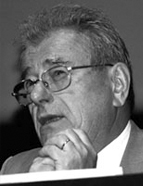

Jacques Marcadé was born in a Gascan village in the Landes, son to primary school teachers. He studied for and graduated from the Agrégation d'Histoire in Paris (a demanding national competition to recruit secondary school teachers). The subject he had been offered for his Master's degree— relations between France and England in the 18th century— had led him to take an interest in the Marquis of Pombal, a personality criticised by both the French and the English. He decided to learn Portuguese— a language similar to the maritime Gascan (or negre ) of his childhood— and, as the subject of his Doctorat d'État thesis, he chose Friar Manuel do Cenáculo, from an initial perspective of religious sociology. He was a teacher at the Poitiers Lycée, and later he was hired by the university of that city in 1964. He was awarded the chair of Modern History in 1976 and ended up directing the History department. Later he was elected Dean of the Faculté des Sciences humaines et des arts [Faculty of Human Sciences and Arts] from 1980 to 1983 and ended his career in 1995 at this university.
Frei Manuel do Cenáculo Vilas Boas, évêque de Beja, archevêque d’Évora (1770-1814) [Frei Manuel do Cenáculo Vilas Boas, Bishop of Beja, Archbishop of Évora] is a thick volume and the result of impressive research done in the Portuguese archives, Torre do Tombo [Tombo tower], the Library of the Academia das Ciências [Academy of Sciences], the Municipal Archives of Évora and the Municipal Library of Beja, the Archivio Secreto Vaticano and all the libraries necessary to produce this monograph, which not only considers the gracious figure of the Bishop of Beja but also places him in the specific life of the dioceses he occupied from 1770 onwards. After evoking the first part of the life of Pombal's counsellor, a time when he was Provincial of the Third Regular Order of St. Francis and President of the Royal Censorial Board and the Board of Literary Providence, Marcadé devoted most of his studies to the specific achievements of the prelate, who had retired to the Alentejo after the crisis of 1777. In the background, the physical and human picture (supported by statistics that Cenáculo himself tried to compile from the number of "sacramental persons") and the moral and material situation of the secular and conventual clergy and the faithful. These were the bases for the examination of the militant pastoral action of the future archbishop of Évora, whose profile is analysed from an essentially spiritual perspective. By putting in perspective the work of someone who was the Marquis' minister at the time of the separation from the Holy See and cleared from censorship or prohibition many works condemned by Rome, Marcadé absolved him of any accusations of Jansenism and/or Gallicanism. He focussed on pastoral visits, commented on by Cenáculo in the detailed Diário [Diary], and which promoted a better exploitation of agricultural resources; on the prelate's charitable activity with the underprivileged; on his role as protector of clerics and even seculars fleeing the French Revolution; on his involvement in the training and instruction of future parish priests, with the creation of the ecclesiastical school of Beja supported by an innovative study plan, and already very similar to a seminary. Marcadé also mentions Cenáculo's remarkable, albeit expensive, bibliophilia, which would result in post-mortem donations of various works from his precious archaeological and numismatic collections to the Public Library of the Court, today the Biblioteca Nacional de Lisboa [Lisbon National Library] and the Library of the Academia de Ciências .
This work is financed by national funds through FCT - Foundation for Science and Technology, I.P, in the scope of the projects UIDB/04311/2020 and UIDP/04311/2020.
